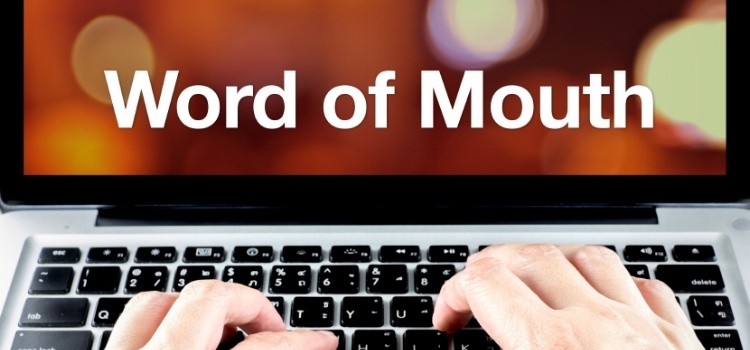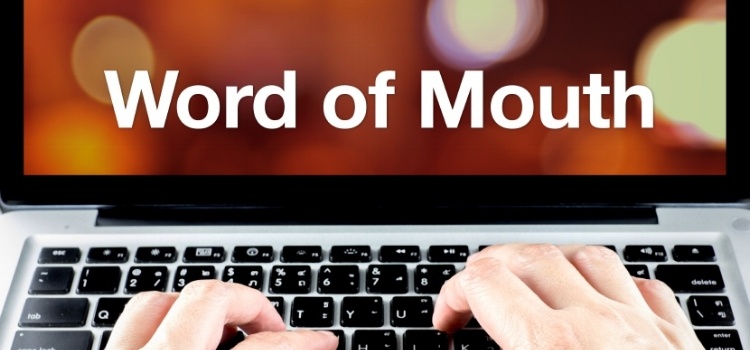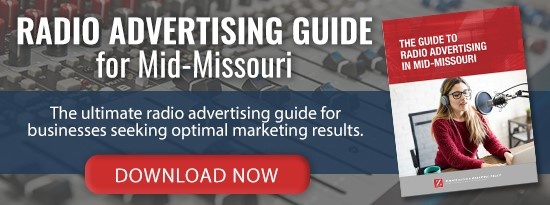Missouri Marketing Resource Blog

Word-of-Mouth vs. Radio: Do You Know the Difference?
 When you're discussing marketing, it's not uncommon to hear the statement "word-of-mouth works for us, and that's enough." For a small business with an extremely limited budget, that may be true, and as you'll see in a moment, word-of-mouth isn't something you want to underestimate. But if you're in the position to debate word-of-mouth vs. radio advertising, it's important to understand radio's effectiveness and what exactly it brings to the table.
When you're discussing marketing, it's not uncommon to hear the statement "word-of-mouth works for us, and that's enough." For a small business with an extremely limited budget, that may be true, and as you'll see in a moment, word-of-mouth isn't something you want to underestimate. But if you're in the position to debate word-of-mouth vs. radio advertising, it's important to understand radio's effectiveness and what exactly it brings to the table.
The Power of Word-of-Mouth
Word-of-mouth can do wonders for your business, especially in the digital age. However, there's a difference between leveraging word-of-mouth tactics to your advantage and depending on them entirely. The problem with the opening statement about word-of-mouth is the part where it's perceived as being "enough." While saying that there's no such thing as enough advertising would be a wild overstatement, it is important to understand that unlike radio advertising, you have no control over how your brand is perceived or how often it's being talked about if you leave it to word-of-mouth. It fits into a different part of your marketing bridge than your typical marketing efforts because it joins the beginning and the end because it also serves a dual purpose in the consumer journey.
Based on their experience with your business — with your sales people, how they perceive your service and support, and if it's positive — people will share their experience. What happens if it's a bad one? What if it's merely mediocre? Unfortunately, 86% of people will hesitate to make a purchase from a local business with negative online reviews, and according to Invesp, one negative review on Yelp can cost you as many as 30 customers.
Now consider the fact that the number of reviews posted every minute by Yelp users is more than 26,000. And if you think that Yelp is limited to retailers and restaurants, you need to take a look at what it actually supports: Just do a search for automotive, financial services, or doctors, each of which includes hundreds of listings for Columbia and Jefferson City, Missouri, alone. The days of merely following the information provided by brands are gone for good. That means that in addition to solid marketing outreach, you'll need to ensure that every step of your marketing bridge will hold strong and ensure a positive experience that will grant the benefits we mentioned previously.
Radio Gives You Control
Utilizing radio advertising addresses some of the biggest weaknesses of word-of-mouth marketing. In fact, part of radio's effectiveness lies in the fact that it gives you the control you need to reach the right customers in the right way.
What's Being Said
With radio, you get to choose the exact message that's extended to listeners. This includes the ever-important call-to-action, which drives customer engagement and conversion no matter what industry you're in. It also includes presenting your brand clearly and accurately, avoiding the potential confusion of word-of-mouth which can, unfortunately, turn into a game of "Telephone" if there's nothing to correct it. It also means you can control the tone of your message and allow you to personalize the creative according to audience, whereas word-of-mouth can tip the tone toward the person speaking instead.
Who's Hearing It
Speaking of personalization, radio lets you select the audience you want to reach. Part of this is tapping into the right radio station, and you need to ensure that the station aligns with your brand as well as your audience. You can target your audience much more specifically, and you can even reach into new markets or reach customers who would never be exposed to word-of-mouth about your brand otherwise. Furthermore, you can track how many people you're reaching so you understand the size of your audience and customer base and the effect that your advertising is having on your bottom line. Quite simply, you cannot accurately measure the audience exposed to word-of-mouth, so you won’t be able to create a clear idea of its actual ROI.
When and How Often You Reach Them
An extension of targeting is the ability to reach your audience at the right moment in their day. You have no control over whether or not word-of-mouth will reach them at a time when it can make an impression, whereas with radio marketing, you can select the right dayparts and listening times to influence your audience. It also plays a much more important role in the consumer journey — raising awareness that leads to action through consistency and frequency.
Radio Is Effective and Positive
Believe it or not, 91% of customers still want to buy a vehicle that includes a typical radio, 84% of which want AM/FM radio and 22% want satellite radio such as Sirius XM. Another 80% chose the AM/FM radio over the ability to connect smartphones or other digital sources of audio entertainment. That's probably because radio is capable of reaching 94% each of Millennials and Gen Xers, as well as 93% of Gen Z, or 245 million Americans. What's more, 45% of Americans trust radio advertising in general.
Of course, this reach alone isn't necessarily cause to turn to radio. For that, you should consider the lift that radio advertising can give your brand. According to research released last year, radio by itself offered an average uplift of 17%, higher than both digital outreach (14%) and TV (13%). If you combine radio with either digital or TV you'll see an average uplift of 23% and 21% respectively. According to the Radio Advertising Bureau, 41% of listeners 12 and older visit a store after hearing a radio ad, while another 28% visited the advertiser's website. What's more, the bureau states that radio provides a 49% ROI advantage over platforms like TV.
A Final Note on Why Radio Fits into Word-of-Mouth
If you still consider word-of-mouth to be important above all else, it's worth noting that you need to remember that radio doesn't limit you to just ad spots on air. Radio can help you generate good word-of-mouth when you partner with stations to hold or sponsor events, contests, or other community outreach. Furthermore, radio actually represents a form of word-of-mouth you may also underestimate: endorsements. About 60% of listeners think of radio hosts like a friend who can be trusted, and 40% of listeners feel the on-air personality makes a broadcast personal.
This is key to understanding why endorsements from these hosts can be so incredibly influential. In fact, according to the Radio Advertising Bureau, 52% hold that their favorite on-air personality influences their opinion, and 51% either considered or purchased a product brought up on-air during that personality's show. Specifically, 55% of listeners stated they trusted a medical or healthcare brand based on the on-air endorsement by their favorite personality. Other case studies by the bureau show that this sort of on-air endorsement can double your traffic both online and in-store.
Now that you have a better understanding of radio's effectiveness, you should understand that the question is less word-of-mouth vs. radio and more integration of word-of-mouth and radio. An omni-channel experience of your brand — one that covers digital, radio, and social media — is going to be the most effective method of reaching your customers where they're at in a meaningful way. Be sure to coordinate with your media partners, too, since they'll have the tools and experience to help you determine and track your audience, and to give you the best advice on what can work for your business and your budget.

